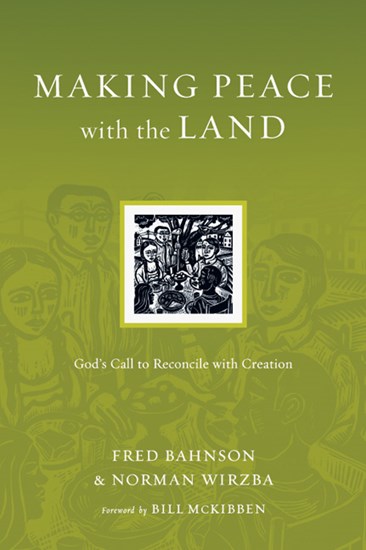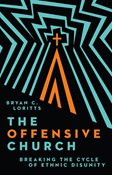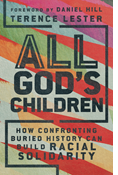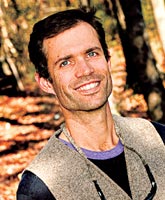
-
paperback
God is reconciling all things in heaven and on earth.
We are alienated not only from one another, but also from the land that sustains us. Our ecosystems are increasingly damaged, and human bodies are likewise degraded. Most of us have little understanding of how our energy is derived or our food is produced, and many of our current industrialized practices are both unhealthy for our bodies and unsustainable for the planet.
Agriculturalist Fred Bahnson and theologian Norman Wirzba declare that in Christ, God reconciles all bodies into a peaceful, life-promoting relationship with one another. Because human beings are incarnated in material, bodily existence, we are necessarily interdependent with plants and animals, land and sea, heaven and earth. The good news is that redemption is cosmic, with implications for agriculture and ecology, from farm to dinner table.
Bahnson and Wirzba describe communities that model cooperative practices of relational life, with local food production, eucharistic eating and delight in God's provision.
Reconciling with the land is a rich framework for a new way of life. Read this book to start down the path to restoring shalom and experiencing Jesus' kingdom of shared abundance, where neighbors are fed and all receive enough.
"I cannot think of another book on making peace with the earth that does so much in so few pages--grounding its case with theological care, describing the causes of 'ecological amnesia' so clearly that they are impossible to disown and offering a vision of practical response that appeals to hope instead of guilt, and all of this while telling stories that make the book difficult to put down! Here is a book for anyone who is ready to trade ecological despair for practical action, in the company of two men who know what it means to be 'married to the land.'"
"This series is on reconciliation, which is at the heart of the Christian faith. One of the early Christians said there are three dimensions to the cross--the vertical, which is about reconciliation with God; the horizontal, which is about reconciliation to other humans; and finally the cross is firmly planted into the earth, which calls us to reconcile with creation. That final dimension is perhaps the most neglected one of all in the piles of books on faith. I am deeply thankful for this addition to the library. We all just got smarter."
"When Mary turned from the empty tomb and mistook Jesus for a gardener, it was no mistake: Jesus is the new Adam. Thank you, Fred and Norman, for reminding us of our Genesis 2:15 responsibility to tend and protect the Garden, this earth, and calling each of us to the good work of living peaceably with the land."
"Making Peace with the Land offers a powerful vision of God as a gardener, physically engaged in the work of restoring all creation to wholeness. And it offers hungry people a way to join in God's work by getting our hands dirty. This is a book about communion in its deepest sense."
"Bahnson and Wirzba have written a compelling summons to food repentance. They call us away from the long-term unsustainable bubble of food in the orbit of fossil fuel. They urge return to the quotidian reality of soil, fresh tomatoes, the daily work of gardening, and realism about the source of food. Their accessible, anecdotal style adds force to the critical bite of their invitation toward life-giving, life-sustaining food."
"This book reminds us of the resources--scriptural, scientific and human--that we have as we try to write a new story, one that emphasizes the need for people to back off, to allow the planet to operate on its own (God's) terms instead of ours. It's a rich book, which is appropriate, since this is a rich and beautiful world."
"Weaving personal stories with pertinent data, the authors call attention to biblical and theological mandates to care for all of God's creation, including the land. Written with a broad audience in mind and with a study guide for each chapter, this book is an excellent resource for churches, communities, and individuals committed to caring for, and reconciling themselves with, the land."
"Books like this usually threaten us with scarcity. Bahnson and Wirzba beckon us with God's creative, 'abundant kingdom homesteading,' correcting our 'reconciliation deficit disorder' by helping us to see that the full scope of divine healing includes all creatures and the whole creation--soil and sea and air, and everything contained and sustained by them."
"This book was written to equip all of God's people to be more faithful ambassadors of reconciliation in regard to the land. . . . Many Christians need to learn again how to live sacramentally in 'God's garden.' This book provides the biblical vision along with down-to-earth examples that can help make this happen."
"Fred Bahson and Norman Wirzba are competent guides to this complicated, urgent subject. Too often, readers are hammered with statistics that, while true, tend to confuse and overwhelm. In this case, however, statistics are absolutely necessary and are used judiciously--in no small measure because of the high level of expertise of both authors."
Bahnson and Wirzba have written a book that is thoroughly Christian, offering inspiration to many of us who seek to understand what on earth (literally) God would have us do. But the book's apologetic value cannot be underestimated. It unfolds the riches of Christian teaching, tradition, experience, and reflection that makes it accessible to those outside the faith. They drive all of us to consider the actual ancient stumbling blocks of Jesus' humanity and his bodily resurrection, and they offer hope."
"In Genesis, God entrusts the care of his good creation to humanity, commanding us to rule it as his vice-regents--which means careful stewardship, not consumeristic exploitation. Determining the difference between the two is sometimes difficult. But with the guidance of prayer, Scripture, and books life Making Peace with the Land, we might find the search for wisdom less difficult than we first thought."
"Without a doubt, our most anticipated book of the next few months. . . . This new collaborative effort promises to be an accessible introduction to both writers' work in defense of land, food and agriculture as essential to God's reconcilation, and should not be missed."
CONTENTS
Series Preface
Foreword by Bill McKibben
Prologue: For God So Loved the Soil . . .
1. Reconciliation with the Land
2. Learning to See
3. Reconciliation Through Christ
4. Field, Table, Communion: The Abundant Kingdom Versus the Abundant Mirage
5. Reconciliation Through Eating
6. Bread for the Whole Body of Christ
Epilogue: . . . So We Can Eat from the Tree of Life
Acknowledgments
Recommendations for Further Reading
Study Guide
Notes
About the Duke Divinity School Center for Reconciliation
About Resources for Reconciliation














